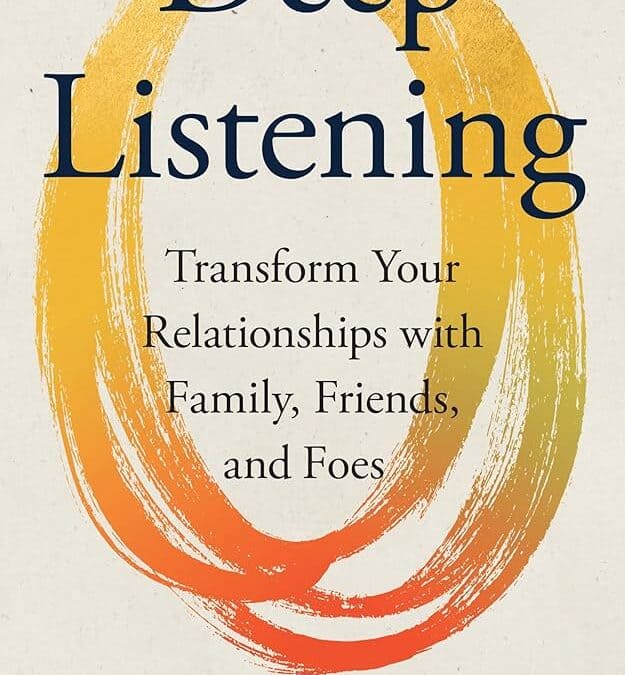What is important about this book
Our existence is shaped by the bonds we weave – with family, friends, colleagues, neighbours, and even those we cross paths with only for a moment. These connections represent our true wealth. It is in the encounter with others that we discover who we are, where we feel we belong, and where we find meaning in our lives – fleeting but precious. However, these relationships are becoming increasingly fragile and habitual: distracted by our personal agendas, fast-paced lives, and polarised disagreements, we often listen without truly understanding. Listening may be the simplest gesture, yet it is the most neglected in both public and private life. What if we paused and truly listened?
Deep Listening reveals that our fears around relating to “outsider” groups often stem from unconscious projections and internalised social scripts. We tend to approach those we perceive as different – for political views, social class, religion, or culture – with suspicion or defensiveness, often without even realising it. When we take the time to reflect on our assumptions and emotions, we become more capable of truly listening to others.
In this book, Emily Kasriel – award-winning BBC journalist and executive coach – invites us to pause and listen, not to react, counter, or collect information, but to listen in order to transform: to move from “transactional” conversations to encounters that generate learning, trust, and renewed understanding.
Quotes
- “Standard listening is transactional; Deep Listening is transformational”.
- “You acknowledge a speaker’s humanity when you practice Deep Listening; you grant them respect and empathetic space so they can ignite sparks of fresh thinking”.
- “When you Deeply Listen, you have the potential to enhance the mental health and self-awareness of your speaker as well as your own well-being”.
- “Many fear that opening themselves to another’s worldview signals agreement or approval, but Deep Listening is about understanding, not endorsement”.
- “We so often hear without understanding, impatiently waiting for our turn to speak”.
- “Deep listening is about conversations where we don’t assume that we already understand. It’s about using curiosity to try and see the world from another person’s perspective and temporarily withholding judgment to accept that person holds these perspectives”.
Structure and contents of the book
The book is divided into three parts: the first explains exactly what Deep Listening is and what it is not, the second part is the heart of the book, that is, an eight-step journey guiding you toward Deep Listening, and the third addresses risks and initial questions, as well as ethical conundrums, offering suggestions on how to reflect on your own listening experience to support our journey.
The eight steps to Deep Listening:
- Create Space: build a psychologically and physically safe space, where the speaker feels welcomed and respected.
- Listen to Yourself First: if we are not willing to truly listen to ourselves, we will never be fully open to listening to others or to recognising our own shadows and biases.
- Be Present: be fully present in the conversation, resisting internal and external distractions.
- Be Curious: adopt a genuinely curious mindset, avoiding the assumption that you already know what the other person thinks.
- Hold the Gaze: express attention through eye contact and posture, picking up on what is left unsaid.
- Hold the Silence: do not fear silence; use it to give space to the speaker and to reflection.
- Reflect Back: express what you’ve understood, not just at the level of content but also emotional and implicit meaning.
- Go deeper: move beyond the explicit level to access unspoken needs and deeper meanings.
This is not about giving up truth or critique, but about modifying the tone and creating a relational space that allows more complex, authentic, and human stories to emerge.
Instructions for reading this book
Deep Listening offers tools and inspiration to unlock the power of meaningful and lasting connections. The core idea of this book is that listening deeply to people you disagree with does not contaminate you or require you to compromise your values.
The eight-step journey was developed by Kasriel based on years of work at the BBC, dialogue experiences in polarised contexts, and studies of human behaviour. Each step is accompanied by stories from journalism, organizational leadership and coaching, scientific research, and practical guidance, all in an accessible yet never simplistic style. The book often highlights the need to listen not to reply, but to truly understand, recognising the other as a human being with a story, emotions, contradictions, and dignity.
The strength of this book lies not only in the model itself, but in the ongoing invitation to disarm listening, to recognise the other without automatic filters, and to accept the risk of true understanding. A message as simple as it is subversive, in a world where everyone talks but few truly listen.
Deep Listening is a recommended read for anyone with a relational responsibility: managers, team leaders, coaches, HR professionals, educators, journalists. But it is also a book for those seeking a personal transformation in how they relate to others. It’s a text that can support a learning journey on communication, Psychological Safety, conflict management, or empathetic leadership. Each chapter offers concrete examples and reflection questions that promote introspection and change. Reading it slowly, perhaps returning to it over time, helps internalise not only the principles but also the mental and emotional posture that the author encourages.
Deep Listening is not just a relational technique, it’s a transformational act. It means recognising the humanity of the other, pausing the urge to respond, and creating a space where the speaker can discover something about themselves while speaking. This kind of listening is now essential not only for building truly authentic relationships, but also to face conflict, guide teams, build communities, and generate deep insights in leadership.
